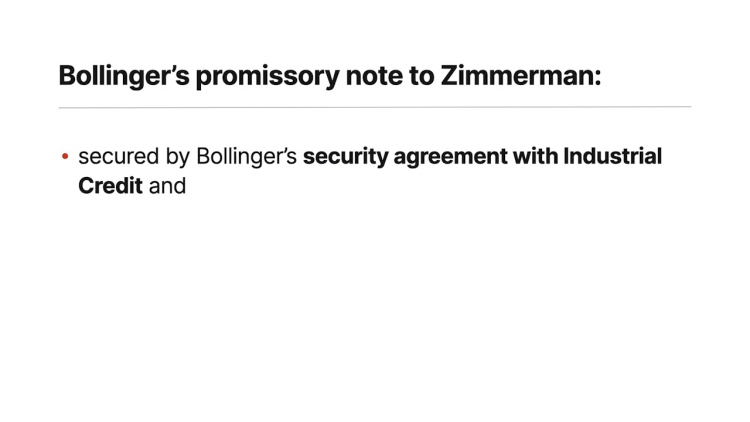In re Bollinger Corp.
United States Court of Appeals for the Third Circuit
614 F.2d 924 (1980)

- Written by Sean Carroll, JD
Facts
Industrial Credit Corporation loaned $150,000 to Bollinger Corporation (debtor). Bollinger signed a promissory note in favor of Industrial, and the parties signed a security agreement, including certain Bollinger equipment and machinery as collateral. Bollinger paid off $85,000 of the loan and at that point secured a second loan, from Zimmerman & Jansen, Inc. (creditor). This loan was also for $150,000, including Zimmerman assuming the remaining $65,000 on the Industrial loan and an additional $85,000. Industrial assigned to Zimmerman the original promissory note and security agreement. Bollinger signed an additional promissory note in favor of Zimmerman for the new loan. Bollinger and Zimmerman did not sign a formal security agreement, but Zimmerman filed a financing statement detailing the machinery and equipment used as collateral for the Industrial loan. In addition, letters between the parties presumed that a security interest in the machinery and equipment had been created. Subsequently, Bollinger filed for bankruptcy. The bankruptcy court held that, because of the assignment of Industrial’s security agreement, Zimmerman was entitled to the remaining $65,000 on the Industrial loan. The court held, however, that because the parties did not sign a security agreement for the second loan, Zimmerman was not entitled to the additional $85,000 it was claiming. The United States District Court for the Western District of Pennsylvania reversed, finding that the promissory note alone was sufficient to constitute a security agreement. Bollinger’s trustee in bankruptcy appealed.
Rule of Law
Issue
Holding and Reasoning (Rosenn, J.)
What to do next…
Here's why 907,000 law students have relied on our case briefs:
- Written by law professors and practitioners, not other law students. 47,100 briefs, keyed to 996 casebooks. Top-notch customer support.
- The right amount of information, includes the facts, issues, rule of law, holding and reasoning, and any concurrences and dissents.
- Access in your classes, works on your mobile and tablet. Massive library of related video lessons and high quality multiple-choice questions.
- Easy to use, uniform format for every case brief. Written in plain English, not in legalese. Our briefs summarize and simplify; they don’t just repeat the court’s language.





